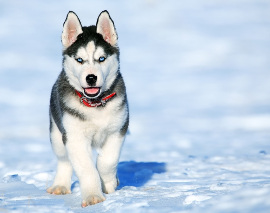 Does your dog have a seemingly endless struggle with health problems that never seem to improve? If the issues include patches of raised, crusty skin, dull or dried out fur, or problems with digestion, your dog may be suffering from a zinc deficiency.
Does your dog have a seemingly endless struggle with health problems that never seem to improve? If the issues include patches of raised, crusty skin, dull or dried out fur, or problems with digestion, your dog may be suffering from a zinc deficiency.
Zinc deficiency can be genetic in northern breeds, such as Huskies and Malamutes. It is also more common to see in giant breeds like Great Danes and Saint Bernards. Large breed dogs such as German Shepherds and Dobermans are commonly affected, too. However, having a smaller breed doesn’t mean your pet is off the hook. As with most pet-related health problems, the culprit is almost always the same: diet.
Zinc is the second most-used mineral in your dog’s body, next to iron. It is a powerful anti-oxidant, and is also necessary for over 300 metabolic processes. For some of those processes it works alone, and for others it pairs with calcium, copper, and other minerals. Despite being so vital, your pet’s body has no way to store it. This means that your canine needs a constant supply of zinc in their diet to live healthfully.
To make things more complicated, only 5% to 40% of the zinc your dog consumes gets absorbed into their bloodstream, depending on the quality of the food they eat.
Diagnosing a zinc deficiency in dogs can sometimes be tricky. This is because symptoms can change over time, and often don’t appear to be related. It is common for zinc deficiency to be misdiagnosed as food allergies. A good indication that the problems do point to zinc, and not some other ailment, is that it’s very rare for dogs to develop a series of seemingly unrelated health conditions. Also, symptoms of zinc deficiency will always worsen over time if not addressed.
With zinc deficiency, symptoms almost always present themselves in this order:
Digestion difficulties, including diarrhea and appetite changes. Hair loss or dulling of the coat may occur. At this stage, food allergies are commonly misdiagnosed.
In the second stage, dermatitis presents as patches of raised, crusty skin that may be mistaken for hot spots. These patches are most commonly found around the groin, eyes, and muzzle area.
Next, the immune system either overreacts or under-performs. This can cause a string of seemingly unrelated health problems to occur. For many dogs, cancerous tumors may begin to form.
After the immune system begins to unravel, the thyroid begins to malfunction. This causes rapid changes in weight, appetite, skin and coat, and can sometimes cause a persistent cough.
Organ failure, usually of the kidneys, liver, and heart, is the second last stage.
The final stage is seizures. This is caused because the taurine needed for brain function cannot work without enough zinc.
A proper diet is the first and most important step towards preventing zinc deficiency in dogs. In fact, this deficiency is often referred to as ‘generic dog food disease’ because many low-quality dog foods do not provide sufficient levels of zinc. Consider upgrading your pooch to a high-quality, human-grade dog food. Some of the most popular brands in Canada are Acana or Carna4. Or consider switching to a raw diet.
Puppies are more susceptible to zinc deficiency, as are pregnant and lactating dogs. If your pooch is showing any of the signs of a deficiency, consider supplementing with a good quality zinc supplement, such as Zinpro. Most dogs see significant improvements after just three to six weeks.
Always see a veterinarian if you have any immediate concerns about your pet’s health.
Brandon Forder – also known as The Pet Expert – is Vice President of Canadian Pet Connection, a family owned and operated business located in Meaford, Ontario. He has over twenty years experience specializing in pet nutrition, behaviour and lifestyle. Canadian Pet Connection is an industry leader committed to providing their clients with the highest levels of personal, attentive service. Learn more at www.CanadianPetConnection.com.











